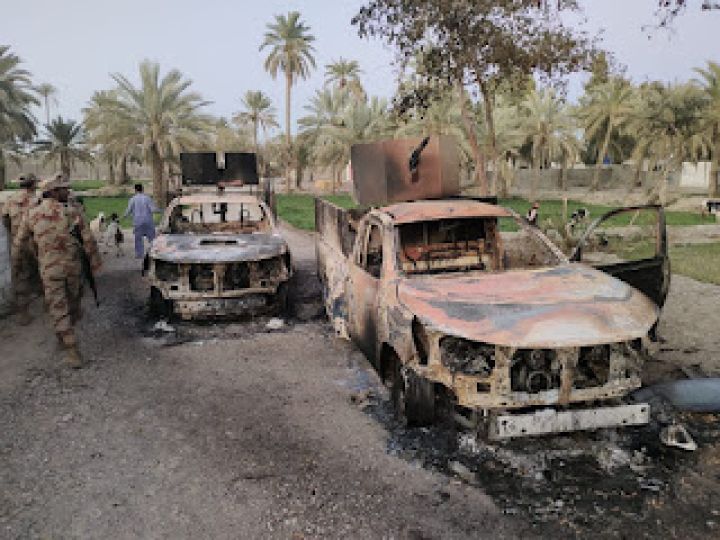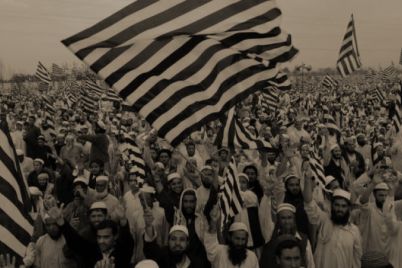The Baloch are waging a struggle for their political and national rights -- and the struggle to own their natural resources and destiny. In their effort to suppress the Baloch struggle, the Pakistani military has employed every tactic – from rape to enforced abductions – without any success. There will be no peace in Balochistan until the Baloch get the same political rights the citizens in the civilized world enjoy – including the right to secede from Pakistan.
Arif Jamal
On February 2, Balochistan Liberation Army’s (BLA) Majeed Brigade – known for its self-sacrificing operations – launched Operation Ganjal on paramilitary Frontier Constabulary camps in Naushki and Panjgur. In Naushki, according to London’s Guardian, 16 FC soldiers and nine BLA fighters died before fighting came to an end after 16 hours while fighting in Punjgur FC camp continued into its third day with BLA claiming downing a military helicopter which could not be confirmed from independent sources. The two attacks started when PM Imran Khan was preparing to leave for China where he received a cold reception. It is however not clear if the attacks were planned to coincide with the prime minister’s visit to Beijing.
In a 20-minute video released after the fighting came to an end, BLA leader Bashir Zeb claimed that it lost 16 men and killed 195 FC soldiers. ISPR denied – exaggerating BLA losses and understating the military’s losses in the attacks. However, the military confirmed the death of at least one officer — Major Bilal. Balochistan is an information black hole. Independent press is banned from reporting for all practical purposes. Even after the passage of 20 days after the fighting in Punjgur FC camp came to an end, there has been no independent account of what happened at the FC camps in Naushki and Punjgur. The Pakistani press mostly reported the ISPR press releases verbatim while the BLA relied on the social media for its exaggerated account of the attacks.
We will probably never know the truth about what happened before and during these operations. The truth is somewhere between what the BLA claims and what the ISPR wants us to believe. Guardian quotes an eyewitness as saying, “Today was the worst day, with bombardment and shelling on the camp. We have seen the dust coming out of the camp. Gunship helicopters have been hovering over our heads all day and night.” At 10pm the BLA fighters were still on the offensive on the third day, according to one eyewitness. The witness told Guardian, “It is 10pm and we are hearing huge blasts and crossfire.” Military officials confirmed to Guardian that the Pakistani military used “Cobra and other helicopters as the insurgents are on a run.” The official told Guardian, “The attacks were very well coordinated and they are linked with Chinese interests in Pakistan. It was to show Pakistan is not a safe country,” the official said
The China Pakistan Economic Corridor (CPEC) which links China’s far western Xinjiang region with the strategic port of Gwadar in Balochistan, has intensified Baloch grievances. The Baloch justifiably believe that China is there to exploit Balochistan’s natural and other resources like a colonial power, and Islamabad is helping China in this only to serve the Pakistani military’s narrow interests. BLA, like other nationalist and militant groups, accuse China of exploiting Balochistan’s mineral resources and Pakistan helping them. They have attacked Chinese nationals and interests not only in Balochistan but also Karachi and elsewhere. Instead of addressing the genuine Baloch grievances by giving the Baloch control over their natural resources, Islamabad continues to handle the Baloch question with more repression and by blaming the foreign hand – India. Some ISPR-certified commentators also blame the West for the rights movement in Balochistan.
The genesis of the Baloch question can be traced back to the violation of the agreement Jinnah signed with the Khan of Qalat in 1948. The post-1948 history shows that Baloch nationalism tends to become violent in proportion to the suppression of democratic, national, and human rights in Balochistan. Unfortunately, it is not just the military regimes which suppress/suppressed the democratic, national, and human rights of the Baloch, the civilian governments in Islamabad from Z A Bhutto to Imran Khan Niazi are equally to blame, though the civilians have made some efforts to right the situation in Balochistan. However, no civilian has challenged the Pakistani military’s tyranny in Balochistan. Violence came down considerably during the 30-month long government of Chief Minister Abdul Malik from June 2013 to December 2015. Prime Minister Nawaz Sharif chose Chief Minister Malik in the hope that he would be able to build bridges with the nationalists, but the political process was stopped after he left the government in December 2015. Had the political process Chief Minister Malik started continued, the situation would have been much better. Unfortunately, Chief Minister Malik’s successor undid the good work of his predecessor and let the military have a bigger role in Balochistan.
The Eighteenth Constitutional Amendment was another attempt to address the grievances of Pakistan’s smaller provinces, but again the Pakistani military did not let the political process continue. General Qamar Bajwa has reportedly said that 18th amendment is more poisonous than Mujjibur Rehamn’s 6 points. The Baloch are waging a struggle for their political and national rights — and the struggle to own their natural resources and destiny. Islamabad has suppressed their struggle at the behest of Pindi. In their effort to suppress the Baloch struggle, the Pakistani military has employed every tactic – from rape to enforced abductions – without any success. It is time they learn the lesson and abandon their inhuman oppression in Balochistan. There will be no peace in Balochistan until the Baloch get the same political rights the citizens in the civilized world enjoy – including the right to secede from Pakistan. Follow us on Twitter @AlterVoices




